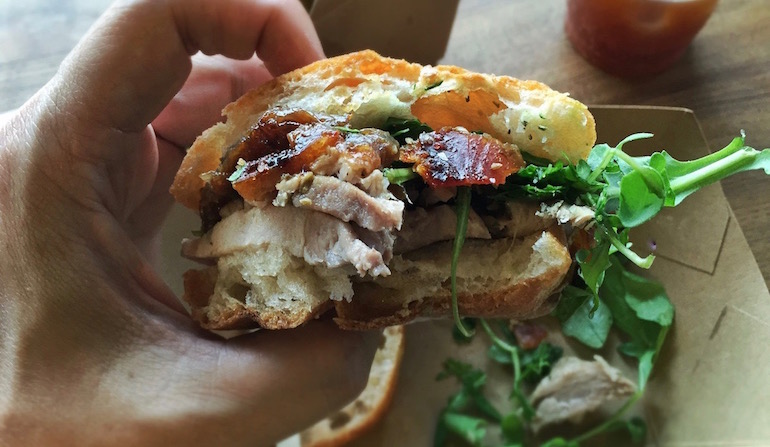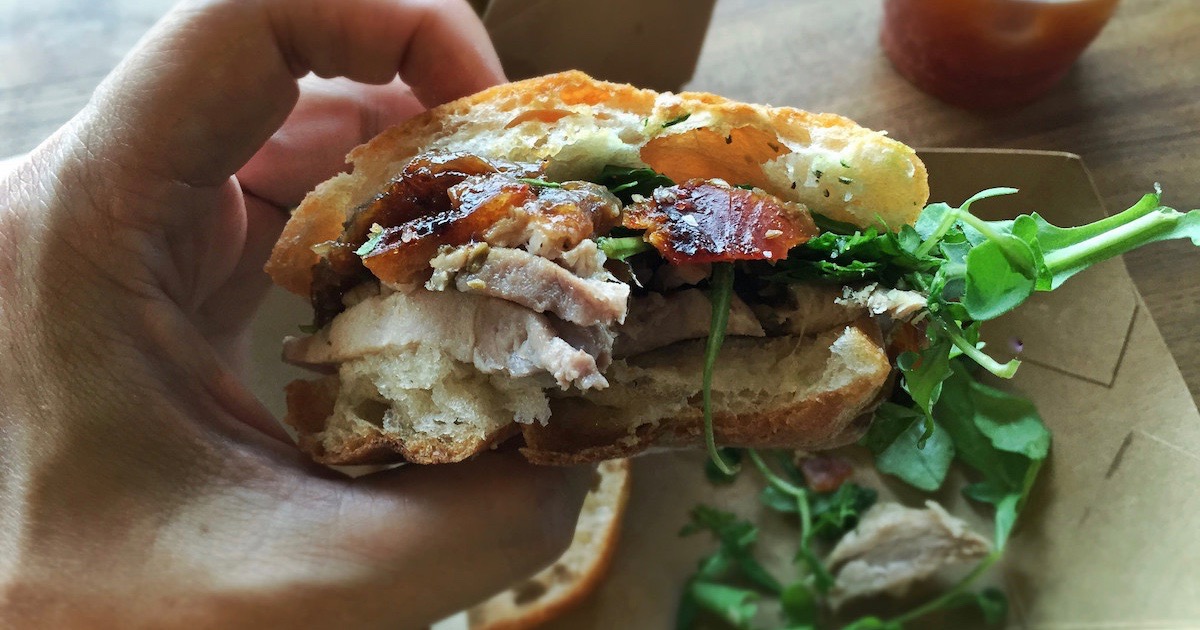 Culture & Ethics
Culture & Ethics
 Evolution
Evolution
 News Media
News Media
Evolution and the Insensitive Sandwich


David Brooks at the New York Times has taken a lot razzing for a column about social class signifiers and how they serve to insulate the upper middle class and exclude everyone else. He describes “insensitively” taking a friend to a fancy sandwich shop. The friend had “only a high school degree.”
Suddenly I saw her face freeze up as she was confronted with sandwiches named “Padrino” and “Pomodoro” and ingredients like soppressata, capicollo and a striata baguette. I quickly asked her if she wanted to go somewhere else and she anxiously nodded yes and we ate Mexican.
American upper-middle-class culture (where the opportunities are) is now laced with cultural signifiers that are completely illegible unless you happen to have grown up in this class. They play on the normal human fear of humiliation and exclusion. Their chief message is, “You are not welcome here.”
In her thorough book “The Sum of Small Things,” Elizabeth Currid-Halkett argues that the educated class establishes class barriers not through material consumption and wealth display but by establishing practices that can be accessed only by those who possess rarefied information.
To feel at home in opportunity-rich areas, you’ve got to understand the right barre techniques, sport the right baby carrier, have the right podcast, food truck, tea, wine and Pilates tastes, not to mention possess the right attitudes about David Foster Wallace, child-rearing, gender norms and intersectionality.
Among the “right attitudes” he lists, Brooks missed something, didn’t he? Evolution is a theory of origins, but it’s much more than that. Adherence to it, even in the absence of any deep familiarity with its scientific meaning or the evidence for or against it, is also a powerful “cultural signifier.” There could hardly be any more powerful.
While David Brooks was mocked for the slightly precious focus on rarefied sandwich ingredients, he makes a valid overall point. We should add, though, that beliefs about science too play on the “normal human fear of humiliation and exclusion.” This needs to be understood in any discussion of evolution, intelligent design, and allied matters. Even more than intimidation through fear of being punished in one’s career, as a scientist, journalist, whatever, the threat of embarrassment — being associated with the deplorable “creationists” — is a highly effective weapon wielded by evolutionists.
This is nothing new. The dynamic goes way back, as Tom Wolfe notes repeatedly in his brilliant recent book, The Kingdom of Speech. As Wolfe describes, the stage was set for the embrace of Darwinism by “what the German sociologist Max Weber called ‘the disenchantment of the world.’ Well-educated, would-be-sophisticated people all over Europe had begun to reject the magical, miraculous, superstitious, logically implausible doctrine of religion…” The emphasis there should be on “would-be” sophistication — being perceived as sophisticated.
This worked to evolution’s great advantage. Before long, “people began to judge one another socially according to their belief, or not, in Darwin’s great discovery.”
Alfred Russel Wallace, co-discover of evolution by natural selection and later a defector to intelligent design, did not possess Charles Darwin’s social ranking, and this affected the reception he received from England’s ladies and gentlemen. Wallace, after all, was a mere “flycatcher” by trade:
[He] never felt comfortable with any of them except [geologist Charles] Lyell, who was the old man of the naturalists and had first noticed his talent back in 1855. The others, including Lyell’s wife, Mary Horner Lyell, intimidated him. She found Wallace’s table manners common, bordering on crude.
Probably, Wallace would not have known how to order a “Padrino” or a “Pomodoro” if his life depended on it. More:
They [the Gentlemen] had upper-class drawls…They excelled at the sort of ironically clever conversation they had picked up and polished at Oxbridge. Even their blandest comments piped out UPPER CLASS! UPPER CLASS! without bringing up the subject of class at all.
How little things have changed! Wolfe knows all about the pull that prestige exerts in the history of ideas. His real story in the book is about the evolution of speech and how scientists have thought about it. So naturally Noam Chomsky plays a huge role. Chomsky was encircled by a glow of “Radical Chic.” It was the 1960s, and Wolfe describes the social function of attitudes about the Vietnam War:
[B]y then, 1967, opposition to the war in Vietnam had become something stronger than a passion…namely, a fashion, a certification that one had risen above the herd.
On the other hand, Chomsky’s eventual challenger, the younger linguist Daniel Everett, was of a lesser status, not just professionally but, what was worse, socially. This was for religious reasons:
[T]he linguist Geoffrey Pullum pointed out something everybody realized…but nobody ever said, namely, that by now, the early twenty-first century, the vast majority of people who thought of themselves as intellectuals were atheists. Believers were regarded as something slightly worse than hapless fools. And the lowest breed of believer was the evangelical white Believer. There you had Daniel Everett….[H]is not merely evangelical but his missionary past was a stain that would never fade away completely…not in academia.
It always amazes me how thoughtful people seem not to see this — the urgent need to be and be seen as “above the herd” — at work in themselves, how it shapes their thinking about a range of subjects. When personal prestige is at stake, the mental picture of yourself that you carry around in your head, personal blindness is the rule, not the exception.
The terror of being “stained” by lower class associations plays an enormous but widely unacknowledged role in maintaining discipline among the upper middle class. You see this in politics, religion, the media, academia, and yes, science, and not least in anything to do with evolution.
